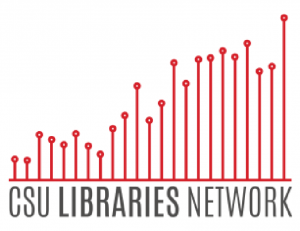
The 23 California State University Libraries share the statement below as articulating the constraints we face in providing service to the students that is our mission. While the Affordable Learning Solutions initiative promotes the adoption of low or no cost materials, students may still find themselves unable to pay for essential reading. When instruction is on campus, libraries can provide short-term access to textbook and other resources through course reserves. To replicate this in a virtual environment, major publishers would need to allow libraries to purchase digital versions of textbooks, which they currently do not. The publishers' failure to do so deprives students who cannot afford a personal digital edition of the resources essential to their pursuit of an education. We thank our colleagues at the University of Guelph Libraries who shared their challenges and the librarians at Grand Valley State University for their eloquent statement.
Grand Valley State University’s
Statement on Textbooks in the Library Collection
As we approach the fall 2020 semester, library faculty and staff are working hard to provide alternative access to the print course reserves collection. A significant portion of the books on reserve are print copies of required textbooks, and students cannot access them without coming into the library. Library faculty and staff have continuously explored approaches to how we acquire course textbooks, to ensure that students have access, even in a hyflex, distance delivery environment.
This work is complicated by textbook publishers who do not provide electronic purchasing options for libraries. Many existing course textbooks are simply unavailable to any library, regardless of budget, in formats other than print. Textbook publishers have built their profit models around selling e-textbooks directly to students. We also know that the cost of textbooks and other course materials are a barrier for students at every university and essentially sends taxpayer funded student financial aid back to content providers, who further exploit faculty labor and research to monopolize and dominate knowledge production.
This is not a library problem. This is an industry problem that impacts everyone in higher education: students, advocates in support and success roles, faculty and institutional research output, grant funding, and confuses prestige and paywalls with quality in scholarship evaluation.
Despite the library’s commitment to make copies of all required textbooks and course materials available to assist those students who are unable to purchase their own, the following publishers will not allow us to purchase an e-textbook version of their publications:
- Pearson
- Cengage
- McGraw Hill
- Oxford University Press
- Most publishers of ‘common reads,’ popular fiction, and popular nonfiction
- Many health sciences texts
This means that in courses that have adopted textbooks by these publishers, students who do not purchase the textbook will not have any alternative access to the textbook content. These publishers have the resources to support a global reliance on flexible distribution, and choose not to.
We are working with instructors to explore and identify viable textbook alternatives, including:
- Using an existing e-book in the relevant subject area from the library’s e-book collection or requesting that the library purchase one. Many academic e-books that aren’t considered textbooks, and are therefore available for the library to purchase.
- Adopting an open educational resource (OER). OERs are freely available educational materials that are openly licensed to allow for re-use and modification by instructors.
- Creating an online course pack in Blackboard by:
- Posting individual book chapters or excerpts and scanned copies of the content, subject to copyright limitations.
- Linking to content from the library’s existing collection of electronic resources (e-books, journal articles, streaming media, and other digital materials).
Efforts will be made to secure online materials that are free from digital rights management restrictions (DRM) in order to ensure unfettered student access. DRM includes limits on the number of users that can access a resource at any one time, as well as limits on copying, printing and downloading.
Questions?
- Email lib-circ@csus.edu to request materials for courses.
- Reach out to your subject librarian with questions and requests.
